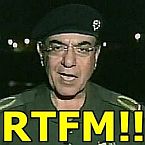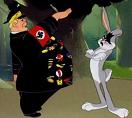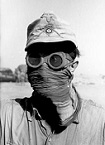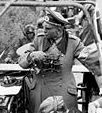aspqrz02
Posts: 1024
Joined: 7/20/2004
Status: offline

|
quote:
ORIGINAL: wodin
quote:
ORIGINAL: Rolandnc
I am hoping the editor allows me to change the initial German armor unit composition. I would hope we could start with MKIIIJ rather than MKII. THis would give the units the long 50mm Hitler ordered. Also.... I had read many years ago... in the late sixties... yes I was in highschool back then.... that German production did not go into full war production until mid war? Anyone can confirm or def refute this? WHy... this could allow us through the editor to increase production and speed up new model introduction??
You are correct...Albert Speer took over in 1942 (correct me if Im wrong)after an aircrash killed his Dr Todt his predecessor...thats really when Germany started to gear up its war production...Hitlers meddling in wanting many variations of different tanks\support guns didn't help either...as non standardized parts became a real problem. STill Tank production increased year on year after that...to little to late...lack of petrol was a killer aswell.
As someone says above I'm not sure it was Speers genius more Germany wasnt making use of its ability to produce early enough.
The "nonstandard parts" problem was not entirely, if at all, due to Hitler's meddling, it was directly related to Germany's overall industrial limitations and limits.
A lot of the vehicles that the Germans used were, in fact, captured ... both trucks and transport as well as armoured fighting vehicles ... and used "nonstandard" parts available in limited amounts from foreign factories with generally low resource allocation and unreliable (i.e. foreign) workers and management ... ISTR that there were over 100 different models of truck used by the German transport units supporting the Mechanized forces in Barbarossa ... just imagine the problem for the poor mechanics and the even more to be pitied supply quartermasters. 100 different carburettors to stock, 100 different gearboxes etc.
The situation wasn't all that much better with the German made vehicles, especially the AFVs, as Hitler was impressed only by numbers of finished vehicles in front of all else, so the factories concentrated on producing whole tanks rather than the spare parts needed to keep them operating. A lot of tanks were out of action at any given time (and this got worse as the war progressed, especially with designs like the Panther) because they had been cannibalised to keep others running, all because of this fixation with finished AFV numbers.
As for "full production" late in the war only, well, yes and no. Speer tried to make out as how he managed it when no-one else had tried but, as I mentioned elsewhere, this wasn't true ... it was because the Germans had industrial expansion plans that chewed up a chunk of their productive capacity in the process of expanding it and these programs (and the expanded capacity they produced) gradually came into service as the war progressed ... they were really long range plans that finally paid off.
As for the "yes" part, well, y'know that Hitler was a sexist pig? Banned women from higher Public Service jobs (Judges, Doctors, Lawyers, Engineers etc.) and basically banned them from University education ("Kinder, Kuche, Kirche") before the war? The same applied in factory work, the Germans were very very late to mobilise women for war work ... but they did to an extent that the Brits and US didn't in the end. By the end of the war a large chunk of AA units were manned by women (yes, I know, the UK did this as well, but in smaller numbers), factories were full of them, and, IIRC, something like 60% (overall) of all university students were women ... even in things like Medicine and Engineering they were present in huge numbers (IIRC, at least 40%)!
As for the fuel. Well, the Synthetic Oil plants plus Ploesti plus the small domestic fields in all the conquered countries *and* severe rationing kept things going ... but, despite what some sources suggest, the StrategiC Bombing Campaign *did* have a massive effect on the oil plants and refineries (synthetic and natural). They didn't (couldn't) destroy them ... they were too dispersed and the bombers not accurate enough ... but after the war the Allies found that the continual bombing and the concussion it created was enough to loosen a lot of seams and create general cumulative damage that resulted in increasing downtime and lost production hours/days because in the end even relatively far off near misses would rupture some weakened or hastily repaired part. Never shut them down, though, not entirely.
In any case, in 1944-45, the German armed forces oil reserves consisted only of what was actually in transit in rail (or road, or water) transport ... there *were* no real reserves ... and this was a huge drag on their operational and strategic planning. By January 1945 the whole economy was quickly shutting down because of lack of fuel (coal and POL) because what was being produced wasn't near enough (POL) or simply couldn't be transported to where it was needed because the rail lines were constantly being cut (the Strategic Bombing Survey noted that, IIRC, the average length of unbroken rail line travel possible in late 44/early 45 was around 20 miles. The Ruhr factories (the last major industrial complex they controlled) closed down for a couple of weeks over Christmas ... because there was no coal to run them, and damned little raw materials to let them make things ... even if they could have kept running!
Tooze's "Wages of Destruction" is worth a read, the USAAF Strategic Bombing Survey is available online (HyperWar? Probably several other places). Overy's "Why the Allies Won" and his work (forget the name) on the Strategic Bombing Campaign are also a good read, he's an excellent writer as well as a good historian ... all those will give you a better idea of the economic hole Germany and Italy were in!
Phil
_____________________________
Author, Space Opera (FGU); RBB #1 (FASA); Road to Armageddon; Farm, Forge and Steam; Orbis Mundi; Displaced (PGD) ---------------------------------------------- Email: aspqrz@tpg.com.au |
 Printable Version
Printable Version




















 New Messages
New Messages No New Messages
No New Messages Hot Topic w/ New Messages
Hot Topic w/ New Messages Hot Topic w/o New Messages
Hot Topic w/o New Messages Locked w/ New Messages
Locked w/ New Messages Locked w/o New Messages
Locked w/o New Messages Post New Thread
Post New Thread